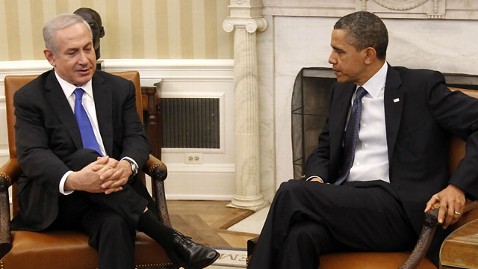Obama Aims to Court Israeli People During First Presidential Visit

AP Photo/Charles Dharapak, File
WASHINGTON - President Obama departs tonight for his first presidential trip to Israel, a largely symbolic visit aimed more at mending rocky relationships than forging substantive policy.
While Obama once said he was putting off visiting Israel until "we are actually moving something forward," he is not expected to make progress on any new peace initiatives during his four-day trip to Israel and Jordan.
The president will land in Israel less than 48 hours after Prime Minister Benjamin Netanyahu's new coalition government was installed, circumstances that further lower political expectations for Obama's visit.
"We've been very clear that this visit is not about trying to lay down a new initiative or complete our work on a particular issue," Deputy National Security Adviser for Strategic Communications Ben Rhodes told reporters. "Frankly, there's value in traveling precisely at a time when there is a new government in Israel and a new government in the United States and just having a broad strategic conversation."
"With a new government, you don't expect, again, to close the deal on any one major initiative," he said. "But you, on the other hand, want to begin a broad conversation about all these issues where we're cooperating on a day-to-day basis. And there are obviously going to be significant decisions in the months and years ahead about Iran, about Syria, about Israeli-Palestinian peace. And so by having this opportunity to speak with Israeli leaders, it can frame those decisions that ultimately will come down the line. And that's the way in which the President is approaching the trip."
While more Americans continue to sympathize with Israel rather than the Palestinian Authority, most prefer for the U.S. not to take the lead in peace negotiations, according to a new Washington Post-ABC News poll.
With the bar set low, the president will spend the bulk of his trip participating in choreographed photo-ops and speaking to the Israeli people, in an attempt to mend relations with America's primary ally in the Middle East.
Obama will also meet with both President Shimon Peres and Netanyahu shortly after his arrival on Wednesday.
The centerpiece of the trip, however, will be the president's speech to the Israeli people, in which he will underscore the strong ties between the U.S. and Israel.
"The president will visit Israel with a message about the enduring relationship between the United States and Israel, about the unshakable commitment the United States has to Israel's security, a commitment that is measured not just in the amount of assistance but in the strong bonds that our people share," White House Press Secretary Jay Carney said.
The president may have his work cut out for him. A new poll finds just 10 percent of Israelis view the president favorably, 19 percent had an unfavorable opinion of Obama and 17 percent had a highly unfavorable opinion.
While many of his predecessors have delivered remarks at the Knesset, Israel's parliament, Obama is opting to address Israeli youth and government officials at the convention center in Jerusalem instead.
"The president will speak to all of the Israeli people in front of an audience of young Israelis who … have it within their hands the power to shape Israel's future," Carney said. "He thinks that's entirely appropriate. And he will be meeting with Israeli leaders and government officials, of course. And you know, the president's, I think, message will be heard by Israelis who are both members of the Knesset and who are not."
The president will also travel to the West Bank to Ramallah, where he will meet with Palestinian Authority President Mahmoud Abbas and other leaders, who are frustrated with Obama's staunch opposition to their bid for statehood through the United Nations.
Obama will visit Bethlehem as well, to tour the Church of the Nativity, considered to be located on the site where Jesus was born. The cultural stop is also an attempt to highlight some of the challenges facing the Christian communities in the region.
Then, Obama is off to Jordan, where he will tour the sites of Petra and meet with King Abdullah to discuss a range of issues, including the crisis in Syria.